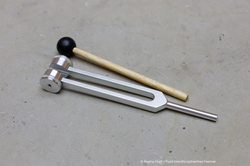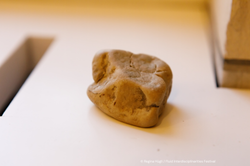
River Relations
© Regina Hügli
Narrating rivers & exchanging knowledge
Informed by experimental formats such as the Human Library and the Market for Useful Knowledge and Non-Knowledge, this session encouraged the exchange of knowledge and stories with a broader public audience. Researchers, practitioners, and artists participated as “river narrators,” each bringing an object that reflected their work or their relationship with a water body. These objects sparked conversations with visitors, who were invited to explore the different rivers, objects, and narrators present. The session was structured into four 20-minute slots, with participants rotating between narrators, ensuring that everyone had the opportunity to speak and engage in dialogue. Now, the collection of objects is available to explore, offering traces of the experiences, connections, and stories that unfolded.
Objects
© Regina Hügli
 |  |  |  |
|---|---|---|---|
 |  |  |  |
 |  |  |  |
Speakers Bio
Anaelle Ghesquière
Anaëlle Ghesquière is a PhD student in sociology at INRAE Montpellier (UMR G-EAU). Trained in socio-anthropology and environmental humanities, she worked during my Master's research on attachments to places in the context of nature conservation in the Comoros, after spending three years in South America, where she taught french and worked as a translator. Her doctoral research, part of a interdisciplinary project, explores how citizens engage in caring for rivers through participatory restoration projects. She studies the formation of communities of care around waterways and the ways in which local knowledge, collective monitoring, and creative methods can nurture more sensitive, democratic relationships with river ecosystems.
Bich Tran
Bich is a PhD researcher at IHE Delft. She has a background in Environmental Science, with her postgraduate study in Water Resources Engineering focusing on Earth Observation applications. She holds a bachelor degree in Water - Environment - Oceanography from the University of Science and Technology of Hanoi and a joint master's degree in Water Resources Engineering from the Vrije Universiteit Brussel (VUB) and the Katholieke Universiteit Leuven (KUL). She has diverse volunteering experiences in environmental and education projects, which led to her interest in interdisciplinary research and applications on sustainable use of water resources. Bich’s PhD project focuses on “Assessing uncertainties in satellite-based estimation of evapotranspiration”, in which she also collaborates with researchers in social science to investigate the use of models in water management and governance.
Bipolar Agency
Bipolar Agency is an artistic and cultural agency that uses storytelling and imagination in experiential and context-specific approaches to support communities in the context of ecological transition. It uses creativity to invent new narratives, open up political imaginations and experiment with sensitive consultation methodologies, drawing on research to evaluate and consolidate its approaches. Its projects bring together residents, communities and scientists around ecological issues (water, coastline, risks, renaturation). Convinced of the power of territorial fictions, Bipolar advocates for a relational ecology based on attachment, listening and care for the environment.
Christelle Gramaglia
Christelle Gramaglia is a Research Director in Sociology at INRAE Montpellier. After completing a PhD on lawsuits related to river pollution cases in France, she did a postdoctoral fellowship at the Max Planck Institute for the History of Science in Berlin, focusing on controversies surrounding the development of aquatic ecotoxicology (for water quality monitoring). Her current research aims to encourage citizen involvement in river restoration projects. She also teaches the sociology of science and technology at the University of Montpellier.
Desiree Hetzel
Desirée Hetzel’s ethnographic research focuses on how people interact with water in the form of rivers and lakes, as well as water infrastructure, and how these relationships are changing due to climate change. As water sources dry up and water becomes scarcer, new forms of communication are required. In her work, she combines scientific perspectives, everyday knowledge and artistic approaches. Alongside water authorities, citizens and artists, she explores new ways of collaborating. She is currently conducting this research at the TUM Public Science Lab (www.publicscienceslab.org). You can find more information about her work with Pauline Münch at www.anthroposcenes.de, as well as in a joint podcast 'Touching Water' with Márk Somogyvári, in which they speak with various water experts.
FLUNST Kunstkollektiv
Kunstkollektiv FLUNST is an artist collective in the Altes Land region, Northern Germany. Founded in January 2024, the group creates spaces where people can come together to engage with art, creativity and water bodies. Their work focuses especially on the rivers that cross the region of Altes Land - the Elbe, Este und Lühe.
Heinriken Dahlmann
Heindriken Dahlmann is a doctoral researcher at the IRI THESys (HU Berlin) and a guest researcher at the Potsdam Institute for Climate Impact Research. Within her PhD, Heindriken tries to disentangle how water scarcities, agricultural production, and "virtual" water — the water used to produce goods — are connected, to better understand how problems in one region of the world can lead to socio-ecological impacts elsewhere. Her PhD project is funded by the Heinrich-Böll Foundation.
Jean Philippe Venot
Jean-Philippe Venot works at IRD, the French National Research Institute for Sustainable Development. He has an interdisciplinary research background and investigates irrigation and water governance in the global South. His most research interrogates how water researchers make sense and practice the notion of engagement in arenas that ambition to co-produce knowledge for just transformation. This contributes to an emerging field of reseach on reflexivity in sustainability science.
Laura Betancur Alarcon
Laura Betancur Alarcón is a doctoral researcher in ‘Water security for whom? Social and material perspectives on inequality around multipurpose reservoirs in Colombia’. Her research explores hydrosocial relations within the complex interplay of climate extremes, biodiversity loss, energy infrastructures, and armed violence. She integrates insights from human geography, sustainability science and environmental anthropology in her ethnographic and transdisciplinary research. She holds a Master’s degree in Environmental Studies and Sustainability Science from Lund University, Sweden. Over nine years in the environmental sector, she has contributed as a research assistant, writer, lecturer, and journalist across diverse organisations, including academic institutions, media outlets, and international NGOs.
Mark Somogyvari
Márk Somogyvári is a postdoctoral researcher at the Humboldt University of Berlin. Márk holds a Master’s degree in geophysics from the Eötvös Loránd University of Budapest and a doctoral degree in earth sciences from ETH Zürich, which he obtained in 2017. After his doctoral studies, Márk was a researcher of the Geo.X Young Academy in the numerical mathematics group at University of Potsdam, then he worked as a research assistant in the hydrogeology group of TU Berlin. Márk has experience in applied mathematics and in data science with a special interest in interdisciplinary problems and hydrology. His past works involved the development of tomographic inversion methods for geothermal applications, the characterization of fracture networks in hard rock reservoirs and the application of stochastic numerical methods for aquifer characterization. His current work focuses on making complex models more accessible for wider audiences, with the help of machine learning and statistical tools, and different visualization methods.
Roger Anis
Roger Anis is an Egyptian documentary photographer and visual researcher. He holds a master's degree from the Royal Academy of Arts in the Netherlands, where he focused on water and rivers. A Fine Arts graduate (2008), he began his career in 2010, working with global news outlets such as AP, GettyImages, and The New York Times. His work, exhibited internationally, focuses on underreported social and environmental issues. Roger is also the co-founder of the EverydayNile Initiative, blending photography and filmmaking to expand his visual storytelling across the Nile Basin.
Salma Abusamra
Salma Abusamra is a Sudanese filmmaker and founder of Ratayen Media Production. Her work explores oral cultures and human connections to the Nile. She contributed to the AquaMuse Project, designing stories about the Blue Nile and its communities, and currently serves as the Artistic Director of the Khartoum Arab Film Festival.
Selia Fernández Arconada
Seila Fernández Arconada is a multidisciplinary artist-researcher focusing on contemporary socio ecological uncertainties influenced by climatic shifts, societal disputes and extractive actions towards Nature, specially in bodies of water. With her (eco)socially engaged praxis, she nurtures transdisciplinarity, complex system thinking and ecosocial justice merged with trauma informed approaches to offer carefully created "in between spaces" for situated collaborations. Seila has exhibited internationally as well as leading numerous projects and interventions. Her collaboration with bodies of water has taken her to rivers such Amazon River, Meder, Douro, etc. Most recently Dnipro River. More information: www.seilafernandezarconada.net
Sumit Viji
Sumit Vij is an Assistant Professor at the Sociology of Development and Change Group, Wageningen University & Research. His research focuses on questions of power and politics within the themes of transboundary waters and (peri)urban infrastructure in South Asia, in the times of changing climate and uncertainty.
More Photos

© Regina Hügli
© Regina Hügli



© Regina Hügli
© Regina Hügli


© Regina Hügli
© Regina Hügli











